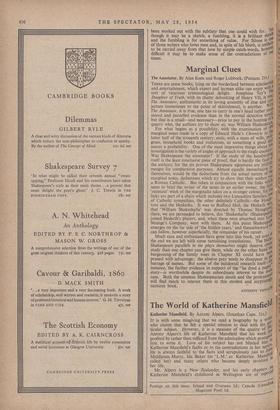The World of Katherine Mansfield
Katherine Mansfield. By Antony Alpers. (Jonathan Cape. 21s.) I, IT is with some misgiving that we read a biography by a writer. who claims that he felt a special mission to deal with his P:4r, ticular subject. However, it is a measure of the quality of "s Antony Alpers's life of Katherine Mansfield that his work Pe4 profited by rather than suffered from the admiration which proMPtt0 him to write it. Love of his subject has not blinded hill.' Katherine Mansfield's faults or to the contradictions in her natil,'"0 He is always faithful to the facts and scrupulously just to Middleton. Murry, Ida Baker (or `L.M.' as Katherine Mansile;0 called her) and many others who became deeply involved her life.
Mr. Alpers is a New Zealander, and his early chapters
'41terest. His book also presents some quite new material, such as eemments by Katherine Mansfield's first husband, George Bowden, tin her first marriage. And yet, though one feels grateful for such a balanced and well- oeurnented account of Katherine Mansfield and her work, one is still Left with a slight feeling of dissatisfaction—dissatisfaction not so much Mth Mr. Alpers's book, which seems likely to be of more lasting value than many others on the same subject, as with the limitations the conventional biography as such. For how can so complex, so "„wided a personality as Katherine Mansfield be re-created, how can l".le contradictions be reconciled and the whole person revealed? „liets, however sympathetically presented, are not sufficient to sum- 011 up the living person and the restless mind. So it is in the last `4aPters of his book, where Mr. Alpers quotes extensively from Katherine Mansfield's journals and letters, where she is allowed to 11eitk for herself, that she comes most fully alive. For she was not c°111Y a self-conscious and fastidious artist but also a highly self- 1?nseious person; she was eompletely aware of her own divided
tore. Near the end of her life she said, commenting on her
xed feelings about a possible new cure for her consumption, L'Inother proof of my divided nature. All is disunited. Half boos, ualr cheers."
ShL Alpers notes Katherine Mansfield's division of her relation- 7.11Ps into 'passional' and 'spiritual' ones. These were but the out- ■ • ard expression of a deep inner division. She had a passionate tlesire for people and for requited affection, yet also needed sometimes ° be solitary, to become clear to herself. Her story 'Prelude,' for example, grew from a period of solitude in the south of France. I, So Katherine Mansfield's life pi-esents, in a Nculiarly intense form, nue Problem of the dedicated life of the artist for a woman. She was Emily Brontë who could achieve complete fulfilment in a deeply- iTagined inner world, nor yet a Virginia Woolf who could order her e to the requirements of the writer. She had a great need for I;e0Ple and places. It was the short happy time she spent with her ,yrother, before he was killed in the First World War, that enabled her rediscover the world of her childhood--that world so central to i'ler later stories.
_Though so intensely analytical and critical of her own nature and ulotives, Katherine Mansfield had from the beginning the power to flter other people's lives, to 'impersonate.' 'The Tiredness of Rosaber for a girl of nineteen, a remarkable feat of projection into the
aracters of other people. Writing in 1916 of her "wasted, wasted 1411Y girlhood", she said: "I lived in the girls, the professor, the big, juvelY building, the leaping fires in winter and the abundant flowers
summer." We can see now that this was no waste but an artist gilining to explore the field of her life's work.
1, Andre Maurois speaks with truth of the feminine world of atherine Mansfield's stories. Mr. Alpers also notes th:s and, (I)Ipughout his book, he gives a penetrating survey of the development kner work. In early stories such as' In a Café' he marks what was to ecele a characteristic pattern—" a private crisis in a woman's life, blissful expectations are shattered at one touch of reality." He esPecially illuminating on the later stories—*At the Bay,' The arden Party,' 'The Daughters of the Late Coloner—where death gad. the acceptance of death are portrayed so poignantly. Mr. A lpers seems, then, to have caught as much as can, in a straight- Ward biography, be caught of so difficult, so elusive a chari.cter as tn4tberine Mansfield. It would •have been interesting if he had Ininented upon her influence on such young writers of the Thirties Auden and Isherwood. What particular quality in her character 4:!(1. her work made them feel so intimate towards her that they spoke dp wrote of her as 'Kathy"? it is strange that young men living such pe"rerent lives should have felt so at home in her very private world. mhps the truth is that all our daydreams are similar ones. do • Alpers has recorded, it' he has not explored fully, the para.- „Fs in Katherine Mansfield's nature. His veneration for his 4411.1eet has not prevented him from moving through her world with IvelY critical judgement. •



































































 Previous page
Previous page